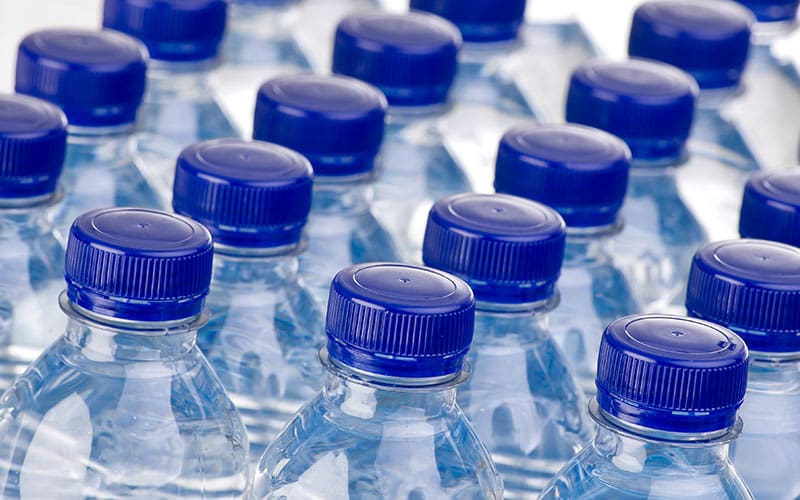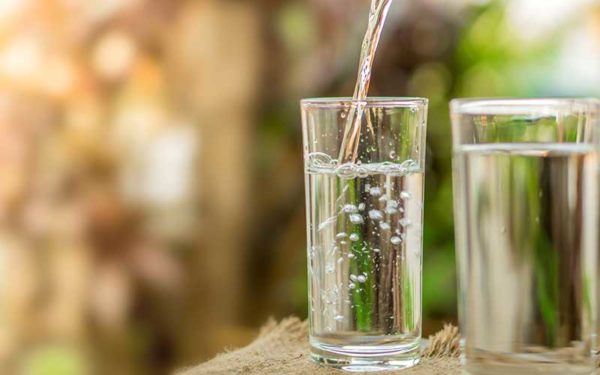
This summer, testing revelaed that bottled water from a Massachusetts distributer had dangerous levels of PFAS. Photo: ericlefrancais via Shutterstock
After dangerous chemicals were found in their tap water, many New England communities were forced to drink bottled water. Now, state regulators are discovering that some bottled water may be contaminated as well. Recent testing revealed that water from a supplier in Massachusetts sold at stores throughout New England contains toxic per- and polyfluoroalkyl chemicals, known as PFAS, at dangerous levels. Even in small levels, PFAS can cause cancer, immune system breakdown, and delayed childhood development.
Unfortunately, this discovery did not prompt the strong regional response needed to safeguard public health. Vermont appears to be the only New England state that took the necessary steps to ensure that the contaminated water is off store shelves. In other states, this bottled water may still be available for purchase in stores.
There are currently no federal or New England state rules that require companies to test for PFAS chemicals in their bottled water. Whether from a bottle or the tap, we all have a right to know what’s in our water. And water with unsafe levels of PFAS should never make its way to consumers in any form.
A Slow Response to Toxic Chemicals in Bottled Water
This summer, when the New Hampshire Department of Environmental Services (DES) sampled a subset of bottled water sold at supermarkets in the state, they found PFAS levels as high as 137 parts per trillion – that’s more than five times the level considered safe by regulators in Vermont and other states.
The source of the contaminated water was traced to a supplier in Haverhill, Massachusetts. Its water has been bottled and sold at stores throughout New England including Whole Foods, CVS, Shaw’s, Stop & Shop, Market Basket, Cumberland Farms, Garelick Farms, and others. Since current rules do not require bottled water plants to test for PFAS, the full extent of PFAS contamination beyond this supplier remains unknown.
State regulators across New England were notified of the high PFAS levels, and the Boston Globe quoted a spokesperson for the New Hampshire DES as saying “we wouldn’t recommend that anyone in the public drink this water.” But the contaminated bottled water may still be on store shelves across the region. And even though the company has closed up shop, the contaminated bottled water will not expire for two years.
Only Vermont appears to have taken the necessary steps to ensure this dangerous product is removed from store shelves.
States Can Help Protect the Public from Contaminated Bottled Water
Despite knowing about the risks of PFAS for decades, the Environmental Protection Agency (EPA) has refused to take meaningful action to regulate these chemicals. In the absence of strong federal laws, states have an important role to play to protect the public from exposure to these dangerous toxics. New England states can follow Vermont’s lead and ensure removal of all bottled water from store shelves from the Haverhill supplier immediately. But this alone will not solve the problem. Testing for PFAS should be required for all companies that sell bottled water, and those results should be available to the public.
Thanks to a push by CLF and our partners, Vermont, New Hampshire, and Massachusetts have enacted or proposed standards for some PFAS in tap water. This means that going forward, public water supplies will be required to regularly test for some PFAS and clean it up to safe levels when it is detected. Maine, Rhode Island, and Connecticut have failed to take even these initial steps to protect the public from this health threat. But because bottled water is regulated under different laws than public water supplies, these new requirements will not apply to bottled water.
Ultimately, we need protective standards on the books that prohibit the sale of bottled water that isn’t safe. We should be able to have confidence that all drinking water—regardless of whether it’s from the tap or is sold in a bottle—is safe.
What can you do if you are concerned about contaminated bottled water?
CLF has won major victories to protect New England communities from polluted drinking water, and we will continue to fight to get PFAS out of drinking water regionwide. Here are a few things you can do today if you are concerned about these toxic chemicals in bottled water:
- Review the New Hampshire test results to determine which brands are contaminated with toxic PFAS chemicals. If these brands are sold in markets near you, ask your local store to remove the contaminated bottled water from the shelves.
- Call your Governor to voice your concerns about PFAS in bottled and tap water and ask them to take action to protect drinking water.
- Contact your state’s drinking water program and ask them to remove dangerous bottled water from stores and require all suppliers companies to test their product for PFAS chemicals.
- Sign up to become a CLF member. We will let you know when there are opportunities to take further action to get PFAS out of drinking water.



